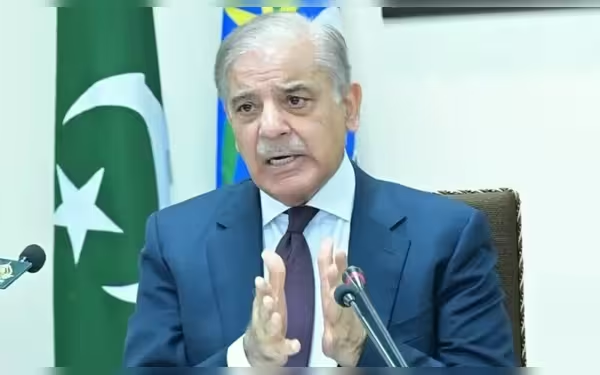Friday, November 8, 2024 04:13 AM
FBR Digitization and Enforcement Key to Economic Reforms: PM Shehbaz
- PM Shehbaz emphasizes FBR's digitization for economic reforms.
- Enhanced enforcement mechanisms to improve tax collection.
- Consultations with stakeholders for effective transformation plan.
 Image Credits: brecorder
Image Credits: brecorderPM Shehbaz Sharif highlights the importance of FBR digitization and enforcement for effective economic reforms in Pakistan.
In recent discussions surrounding Pakistan's economic landscape, Prime Minister Shehbaz Sharif emphasized the critical role of digitization and enhanced enforcement within the Federal Board of Revenue (FBR). The FBR is often referred to as the backbone of the national economy, and its efficiency directly impacts the country’s financial health. During a meeting held on Friday, the Prime Minister outlined a comprehensive strategy aimed at reforming the FBR to ensure better tax collection and service delivery.
Prime Minister Shehbaz highlighted that the digitization of the FBR is not just a modern necessity but a vital step towards achieving significant economic reforms. He directed the relevant authorities to develop a robust enforcement mechanism that would not only improve tax receipts but also enhance the overall service delivery to the citizens. This initiative is expected to uplift the social sector, which is crucial for the welfare of the population.
During the meeting, the Prime Minister called for consultations with prominent taxpayers and stakeholders to ensure that the transformation plan of the FBR is well-rounded and effective. He stressed the importance of seeking approval for amendments in coordination with relevant government departments, which is essential for the successful implementation of these reforms.
Moreover, the Prime Minister reiterated the government’s commitment to promoting the private sector, which he described as indispensable for building a strong economy. He also instructed for a third-party audit of the FBR’s projects to ensure transparency and accountability. The need to curb smuggling was also highlighted, as it poses a significant threat to the country’s revenue.
According to the briefing provided to the Prime Minister, the FBR’s transformation plan includes the effective use of technology, the appointment of efficient officers, and the strengthening of tax enforcement laws. This plan, developed by FBR officers and experts over the past 40 days, aims to facilitate honest taxpayers while ensuring that those who evade taxes face strict consequences.
The approved Home Grown Transformation Plan is a result of extensive analysis of tax receipts over the last 25 years. In its initial phase, the plan will see competent officers posted in Karachi, which is responsible for 32% of the country’s tax receipts. These officers will be supported by auditors and experts to ensure that tax collection is both efficient and fair.
Additionally, the plan includes a reward system for high-performing officers and mandates that they possess professional degrees from reputable universities. This focus on education and performance is expected to foster a culture of excellence within the FBR.
To combat customs duty theft, a new appraisal and enforcement mechanism will be implemented, allowing inspectors to operate without prior notice, thereby enhancing accountability. A combination of incentives and penalties will be introduced for customs inspectors, and new check posts will be established in collaboration with the Frontier Works Organization (FWO) to tackle smuggling effectively.
The digitization and reform of the FBR as outlined by Prime Minister Shehbaz Sharif represent a significant step towards revitalizing Pakistan’s economy. By focusing on transparency, efficiency, and stakeholder engagement, these measures aim to create a more robust financial system that benefits all citizens. As the government moves forward with these initiatives, it is crucial for all stakeholders to remain engaged and committed to fostering a fair and effective tax system that supports economic growth and development.













